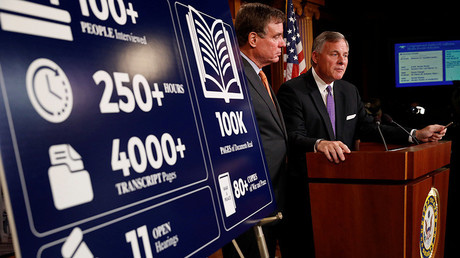$100k 'Russian' Facebook ads are drop in bucket used as pretext to discredit Trump – senator
The potential impact of the so-called Russia-linked Facebook ads recently turned over to Senate Intelligence Committee, is vastly exaggerated, Virginia Senator Richard Black (R) told RT, adding that the only goal of the ever-expanding probe is to defame US President Trump.
On Wednesday, the Senate Intelligence Committee briefed the public on the ongoing investigation into the alleged Russian meddling in the US election. Senator Mark Warner (D-VA), the top Democrat on the Senate Intelligence Committee, advocated new restrictions on online ads. According to a proposed bill, the ads purchased by “foreign entities,” such as Russia, would be labeled as such to “protect” Americans from outside interference.
“If you see an ad on a social media site, Americans should know whether the source of that ad was a foreign entity,” Warner said.
Black believes that the whole issue with Russia-linked Facebook ads is blown out of proportion, arguing that the amount purchased could not influence the campaign in any case.
“When they are talking about social ads, they are talking about a hundred thousand dollars’ worth of ads – that is a drop in a bucket, I mean that’s like throwing a small pebble into the Atlantic Ocean. You’re not going to affect anything with a hundred thousand dollars in ads,” Black told RT.
The Senate Intelligence Committee’s own acknowledgement that the ads were not directly promoting either of the candidates, but “sort of aimed at various people” did not give the accusations against Russia any credibility, he pointed out.
The mere fact that the ads were paid for in Russian rubles cannot serve as compelling evidence of Moscow’s involvement, as they could be just as well purchased by Americans living in Russia, for instance.
“There are plenty of American citizens who are residents of Russia right now who may have just sat down and said: 'You know I’m going to push something out, I’m going to buy Facebook ads and I’m going to spend a few thousand dollars to do it – I’m going to go after Clinton or I’m going to go after Trump.'
“So, the fact that there happen to be ads purchased in rubles tells me absolutely nothing,” Black said.
The fact that nine months into the probe the committee has not come to any definite conclusions and has so far to present any findings, points to the lack of any evidence of collusion between Moscow and the current US administration, Black said, calling the speech by Senate Intelligence Committee Richard Burr and Senator Mark Warner the “most vacuous interview I have ever heard.”
“They have not found any evidence of President Trump or his administration colluding and so they felt the need to sort of come up with something that is anti-Russian,” Black said, adding that he believes that the committee “is designed with an express purpose of undermining the President.”
“The whole plan is farcical,” he added.
After Facebook turned over some 3,400 ads the social media giant said are linked to some fake pages “affiliated with one another” and “likely operated out of Russia,” the focus of the Senate probe shifted to the role of social media.
The ads were purchased in the period from June 2015 to May 2017 and, according to Facebook’s analysis did not endorse either of the candidates but were aimed at “amplifying divisive social and political messages across the ideological spectrum.”
This week, Facebook reported that the majority of the ads, 56 percent, were displayed after the election. Some 10 million American voters are estimated to have been exposed to the ads.



